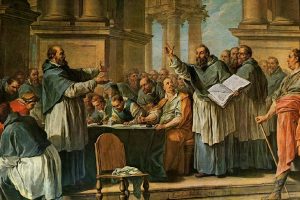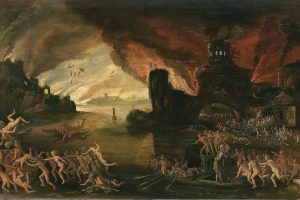Kathy Barkdull started her career in parish ministry the same way many others have: The director of religious education at her parish tapped her on the shoulder and asked if she would teach a class. With a willing spirit and not much more, she agreed. Twenty-five years later, Barkdull is pastoral associate at Holy Spirit Catholic Community in Pocatello, Idaho, and oversees evangelization and discipleship programs, the Rite of Christian Initiation of Adults (RCIA), and other ministries at the 1,200-household parish.
Over the years Barkdull received training through the diocesan certification program, workshops, and seminars, and eventually graduated from the Ministry Extension program at Loyola University in New Orleans. But Barkdull began to understand her work in a new light after she attended a conference of the National Association of Lay Ministers (NALM) in 2004 and heard Zeni Fox, a professor of pastoral theology at Seton Hall University, talk about the theology of lay ministry. Something clicked.
“Finding ways to call lay ministers forth, to support one another, to feel connected—that has really become my passion,” says Barkdull, who left the conference with the idea to start a lay ministry council in the Diocese of Boise, a territory of 84,000 square miles that is home to just 40 priests. At their first gathering in 2004 more than 300 came to listen to Fox give the keynote speech. “This focus has really energized and encouraged me,” Barkdull says.
In a very real way Barkdull’s work as a professional parish minister and lay ministry advocate has been shaped not just by Fox but by a host of Catholic women who have studied, taught, and contributed to theology. The fact that women have only been admitted to graduate-level theology programs at Catholic institutions for the past 70 years means the addition of women to the ranks of church scholars is a relatively recent change.
In the intervening decades, however, Catholic women theologians have helped form both lay and ordained church leaders’ understanding of liturgy, scripture, ethics, pastoral ministry, spirituality, faith formation, theology, and the church itself. This means that regular Catholics, too, have been influenced by women theologians—whether they know it or not.
Founding sisters
According to the U.S. bishops’ 2005 document Co-Workers in the Vineyard of the Lord: Guidelines for the Development of Lay Ecclesial Ministry, there were nearly 31,000 lay ecclesial ministers serving professionally in Catholic parishes eight years ago, approximately 80 percent of whom were women. Simply opening graduate Catholic theological education to laypeople is a key factor in the substantial increase of professional lay ecclesial ministers.
Many of those educational opportunities emerged because of the Sister Formation Movement, says Kathleen Sprows Cummings, associate professor of American Studies and director of the Cushwa Center for the Study of American Catholicism at the University of Notre Dame.
An initiative that started in 1953 to promote advanced study in theology and spirituality for religious sisters (who were often charged with teaching these subjects in Catholic schools), the movement also opened the door for all laypeople. By the time the Second Vatican Council released its pastoral constitution, Gaudium et Spes, in 1965, “it was almost as if Vatican II gave them the language to justify this move, and their belief that women had to start studying theology,” says Cummings.
“I think a lot of people—women, in particular—who are involved in religious education and liturgy planning utilize the resources that women theologians have created,” says Immaculate Heart of Mary Sister Mary Ann Hinsdale, associate professor of theology at Boston College.
One of those who has helped develop liturgical resources is Sister Kathleen Hughes, a Religious Sister of the Sacred Heart of Jesus, a liturgical theologian who served for nearly 20 years on the advisory board of the International Commission on English in the Liturgy (ICEL) and chaired the subcommittee that prepared original texts for worship among English-speakers. (Hughes, the first woman to earn a Ph.D. in liturgical studies from the University of Notre Dame, left her position with ICEL before the most recent translation of the Roman Missal was approved.) “It is always amazing to hear prayers that I or someone on my committee composed being prayed in the liturgy,” she has said.
In the 2012 Madeleva Lecture, an annual event at Saint Mary’s College in South Bend, Indiana that features a prominent woman theologian, Hughes spoke about the church’s understanding of sacraments in the light of the Second Vatican Council. At one point, she referenced the original texts in the Order of Christian Funerals that she helped to develop—nearly 50 prayers that are specific to different situations, such as the death of an infant or a death due to violence, an accident, or old age.
Svea Fraser of St. John the Evangelist Parish in Wellesley, Massachusetts says that it’s precisely the beauty of Catholic rituals—specifically the Eucharist and the funeral rite—that keep her grounded in her Catholic faith. “A Catholic anthropology is so hopeful—you’re loved unconditionally,” she says. Fraser directs her parish’s RCIA program, and she takes the opportunity to include the work of women theologians in the process of explaining church doctrine and tradition to the participants. The group discusses the feminine aspects of God and the value of inclusive language—a tool they can use in their own prayer life, even if it’s not used in the Mass.
And when it comes to church teaching on topics such as contraception and homosexuality—teachings that some catechumens dispute—Fraser is able to bring a breadth of understanding that she acquired in her own studies at Pope (now Blessed) John XXIII National Seminary in Weston, Massachusetts, rather than simply telling them to read and follow the catechism. Fraser’s work illustrates how including women in the community of church scholars has contributed to a better-educated church.
“Women might not have a voice in the curia, but I think of the women I’ve read—Elisabeth Schüssler Fiorenza, Rosemary Radford Ruether, Pheme Perkins, Elizabeth Johnson, Joyce Rupp, Joan Chittister, Macrina Wiederkehr. . . . We women certainly have a voice in the public forum.”
Those voices have helped her recognize why she remains ardently Catholic, even as the faith of many Catholics has been shaken by a wave of high-profile frustrations: the doctrinal assessment of the Leadership Conference of Women Religious (LCWR) by the Vatican’s Congregation for the Doctrine of the Faith (CDF), the clergy sex abuse saga, the new translation of the missal, and other situations.
“I have friends who are holding on [to the church] by their fingernails,” she says. “It’s so easy to feel pushed down by all of that. But there are many wonderful parts of the church, and those things can nourish you and help you to be a better person. They can give you some hope and faith and can help with the complexities and complications of life.”
In the news
Of course, the most recent headlines about Catholic women theologians in particular have focused on controversy. Last June, the CDF issued a notification that Mercy Sister Margaret Farley’s 2006 book Just Love: A Framework for Christian Sexual Ethics (Continuum) was “not consistent with authentic Catholic theology,” and “cannot be used as a valid expression of Catholic teaching, either in counseling or formation, or in ecumenical or interreligious dialogue.”
Several months earlier the U.S. bishops’ Committee on Doctrine censured St. Joseph Sister Elizabeth Johnson’s 2007 book Quest for the Living God: Mapping Frontiers in the Theology of God (Continuum). They claimed it was “seriously inadequate as a presentation of the Catholic understanding of God.”
These pronouncements managed to simultaneously galvanize the authors’ supporters—sales of both books spiked on Amazon.com after the statements were issued—as well as their critics, who remarked on the books’ suspicious theology or outright disloyalty. “There’s been a bigger divide between bishops and theologians in the past decade or so,” says Hinsdale, who was president of the Catholic Theological Society of America (CTSA) when the pronouncement was made against Johnson. The CTSA issued statements in support of both women following the turmoil.
Last September Cardinal Donald Wuerl of Washington wrote a letter to archdiocesan seminarians, warning them about theological reflections that are not in complete alignment with the teachings of the church. “There are theological writers who present teachings contradictory to that of the church’s magisterium but who justify their writings on the grounds that it is the pope and bishops who do not understand the nature of theology. . . . If you have a doubt that one or another teaching that you read or receive does not comport with the Catholic faith, you can turn to the Catechism of the Catholic Church. . . .
[T]he church does define that the authoritative teachers of the faith will not lead us into error and away from Christ. No one else can rightfully make that claim.”
A theologian’s role
The traditional description of theology—St. Anselm’s famous, millennium-old “Faith seeking understanding”—still holds, but there’s murkiness these days around what the role of a theologian is or should be. That’s connected in part to the bishops’ recent move to more vigorously exercise their teaching office.
Take the case of Farley and her book Just Love. In the book Farley explores “the meaning of love and desire in an effort to demonstrate the relationship between love, sex, and justice” and presents seven norms for sexual relationships (do no unjust harm, free consent, mutuality, equality, commitment, fruitfulness, and social justice).
The CDF’s notification last June pointed out the book’s “errors and ambiguities . . . [including] its positions on masturbation, homosexual acts, homosexual unions, the indissolubility of marriage and the problem of divorce and remarriage.” Farley responded in a statement that the book “was not intended to be an expression of current official Catholic teaching, nor was it aimed specifically against this teaching.”
“[What Farley is doing] is how theologians respond to the hook-up culture, violence against women, and the trivialization of sex. These are realities of the world we live in,” says Hinsdale. “The Legion of Decency of years past—that approach just doesn’t work today. Where exactly are theologians supposed to do the kind of work that they do?” she asks.
Part of how theologians “do” theology is through listening to all aspects of the church. Farley, for instance, drew on her collaboration with African theologians responding to the AIDS crisis and her connection with university students she taught at Yale. That creative aspect of theology, Hinsdale says, is one way women have influenced theology—by bringing an experience and perspective that previously had been missing from theological reflection.
Hinsdale says that theology needs to be a mutual collaboration between theologians and bishops. “Ultimately I think we’re on the same side as the bishops,” says Hinsdale. “But I don’t think some of the bishops know how to relate to us [women theologians]. They don’t see women as their equals and they see [themselves] alone as holding the teaching role in the church.”
Despite the situations of Farley and Johnson, the majority of work by women theologians doesn’t attract headlines. But it does still affect Catholics in their parishes and in faith formation programs and pastoral care situations.
“Does it really matter if a theologian is a man or a woman? Well, yes and no,” says Franciscan Father Daniel P. Horan, a recently ordained priest and author of Francis of Assisi and the Future of Faith (Tau Publishing).
“Women’s voices have been excluded from this conversation for so long. The challenge all women theologians pose to both church leaders and average Catholics is to listen seriously to their experiences and voices, and the experiences and voices of all people. But you can’t lump all women theologians together. Certainly not all women theologians are feminist theologians.”
Rethinking feminism
Many Catholics who hear the word feminism might imagine angry women who oppose the hierarchy and support abortion rights. That’s just as true among top leadership as among people in the pews: The Vatican’s doctrinal assessment of LCWR last spring, for instance, noted “a prevalence of certain radical feminist themes incompatible with the Catholic faith in some of the [LCWR’s] programs and presentations.”
Mary Ellen McGuire, pastoral associate at the Catholic Community of St. Thomas More in Chapel Hill, North Carolina, remembers her own low opinion of feminism during graduate school and how that influenced her idea of what feminist theology must be. In graduate school she reluctantly signed up for a feminist theology class. “I was very pessimistic going into it,” she says.
But what she found caused her to reconsider her view. She remembers reading the opening chapter of Elizabeth Johnson’s She Who Is: The Mystery of God in Feminist Theological Discourse (Crossroad Publishing). “It helped me understand that feminist theology means upholding the dignity of women as being made in the image and likeness of God. It helped me to open my heart to who I am.”
Other readings from the class got her to see social and historical realities that helped shape scripture and tradition in ways that frequently left out women’s perspectives and voices.
She’s careful about how she presents these ideas to those she works with. “People typically have a pretty set faith structure, and it’s important not to threaten that. But I do feel called to bring attention to certain things in our church and our world through the lens of women,” she says.
As a pastoral minister she finds herself sidestepping the word feminism, even as she embraces the gifts that feminist theology offers the church. McGuire knows personally how misunderstood the term often is. “Many Catholics associate it only with being pro-choice, unfortunately,” she says. “That’s not an accurate understanding of what feminist theology is.
“Catholic women theologians sometimes are able to voice things I feel unable to say,” McGuire says. “Their courage inspires me, and they have helped me to articulate my insights, to form my prayer life, and to trust my theological instincts.”
Fifteen years ago, when Jana Bennett was a student at Princeton Theological Seminary, she remembers her professor commenting that Catholics were “way ahead” of Protestants in the field of feminist theology.
“Maybe it’s not as stark as my professor made it out to be, but it’s true that so many of the big names in feminist theology are Catholic,” says Bennett, who was raised Methodist and was pursuing ordination when she was enrolled in the class. “It made me wonder if there was some dynamic in Methodism—or Protestantism in general—where the measure of gender equity was ordination at the expense of other roles in the church, such as theologian.”
Bennett, who became Catholic in 2003, is now an associate professor of theology at the University of Dayton. She is also assistant editor of the blog catholicmoraltheology.com and teaches in the university’s gender and women’s studies program. She still assigns Freeing Theology: The Essentials of Theology in Feminist Perspective (HarperOne), a 1993 collection of essays by leading women theologians, to her students. “It was published 20 years ago, but it still gives the background that they need to have,” she says.
Bring-your-work-to-church day
“When I think about my role as theologian, part of it involves catechizing my students in the faith, and part involves pushing against their boundaries. I try to get my students to think about the big questions,” says Bennett, whose most recent book is Aquinas on the Web? Doing Theology in an Internet Age (Continuum).
Bennett is also the mother of two preschoolers and is involved with Catechesis of the Good Shepherd (CGS), a Montessori-based faith formation program, at Immaculate Conception Church in Dayton. “With Catechesis of the Good Shepherd, I’m introducing my children to the wonder and awe of God. That’s what I’m doing for my college students, too.” CGS, Bennett points out, was founded by Sofia Cavalletti, an Italian scripture scholar who used her professional expertise to revolutionize religious education for young children. The program is now in 37 countries, and in more than 1,000 churches in the United States.
Bennett isn’t the only theology professor who brings her work to her parish. Colleen Campion, director of liturgy at St. Timothy Parish in Norwood, Massachusetts, points to parishioner Jane Regan, associate professor of theology and religious education at the Boston College School of Theology and Ministry, who has helped run programs for the parents of children preparing for their first communion.
“I was so impressed with her approach,” says Campion. “She spoke in a way that really connected with people and made her theology real. She has kids of her own and talked about their faith development.
“What she writes about—total community catechesis—and what she does in class really honors where a person is in his or her own faith life. It’s been very influential in how I’ve approached my own ministry.”
The future of Catholic women in theology
Hinsdale, who has been teaching undergraduate and graduate-level theology students for three decades, says that in recent years her students take it as a matter of course that they have women as theology professors. But that certainly wasn’t the case when she was doing her graduate studies at Catholic University of America and at St. Michael’s College at the University of Toronto.
And while Hinsdale continues to see young laywomen (but few religious sisters, unlike when she was a student) complete graduate theology programs, their typical career trajectory is different from her own. Very few go on to teach at diocesan seminaries, which is where she landed after finishing her Ph.D.
“At the time seminaries were a wonderful place to teach,” says Hinsdale, who taught at the now-defunct St. John’s Provincial Seminary in Plymouth, Michigan. She points to the apostolic visitation of seminaries in the early 1980s as a time when that collegial environment started to change, and when diocesan seminaries turned their focus to those students who are seeking ordination. “Eventually, most of the women [faculty] just left the diocesan seminaries.”
Svea Fraser represents another perspective on that time—she was one of just two women to earn a master of divinity degree from Pope (now Blessed) John XXIII National Seminary. “It’s my great sadness that there’s not been even one woman student since I left,” says Fraser, who received her degree in 1989.
And following the increased scrutiny of theological writing by doctrinal offices at both the national and Vatican levels, Hinsdale sees another sobering development. “There’s been a chill factor among women doctoral students. They see what’s happened [with Johnson and Farley], and they’re waking up to the reality that they want to do their work in an ecclesial context, but they don’t know if they’ll be allowed to.”
She points to womenintheology.org, a blog where a group of female graduate theology students from several schools post reflections on social issues and church teaching—but most of the bloggers refrain from identifying themselves by their full names.
No matter how chilly the climate may be for Catholic women theologians in the future, however, there’s recognition that their impact thus far is significant and ongoing.
Cummings points to what happened one evening seven years ago as an example. She was one of hundreds of people who attended a sold-out lecture by Elizabeth Johnson, who was speaking about her then-latest book, Truly Our Sister: A Theology of Mary in the Communion of Saints (Continuum). Afterward, Cummings saw a friend, a married mother of five adult children and a cradle Catholic, who was shaking her head in wonder.
“I always had a problem with Mary and I didn’t know what it was,” she told Cummings, referring to the obedient, virginal, domestic lady in blue that had been her image of Mary until that night. Johnson shattered that image, and replaced it with the image of a spirited, scandalous, prophetic, poor, liberated, and joyful refugee: “This is a Mary I can live with,” she told Cummings.
“Women like Johnson are transforming the church in a profound way,” says Cummings, who witnesses a few of her students having the same kind of “aha” moment every semester after some particular reading captures their imagination. “You can’t put the genie back in the bottle. Once you’ve experienced it—you can’t go back.”
This article appeared in the January 2013 issue of U.S. Catholic (Vol. 78, No. 1, pages 12-17).
Image: iStock Photo/Aydin Mutlu













Add comment